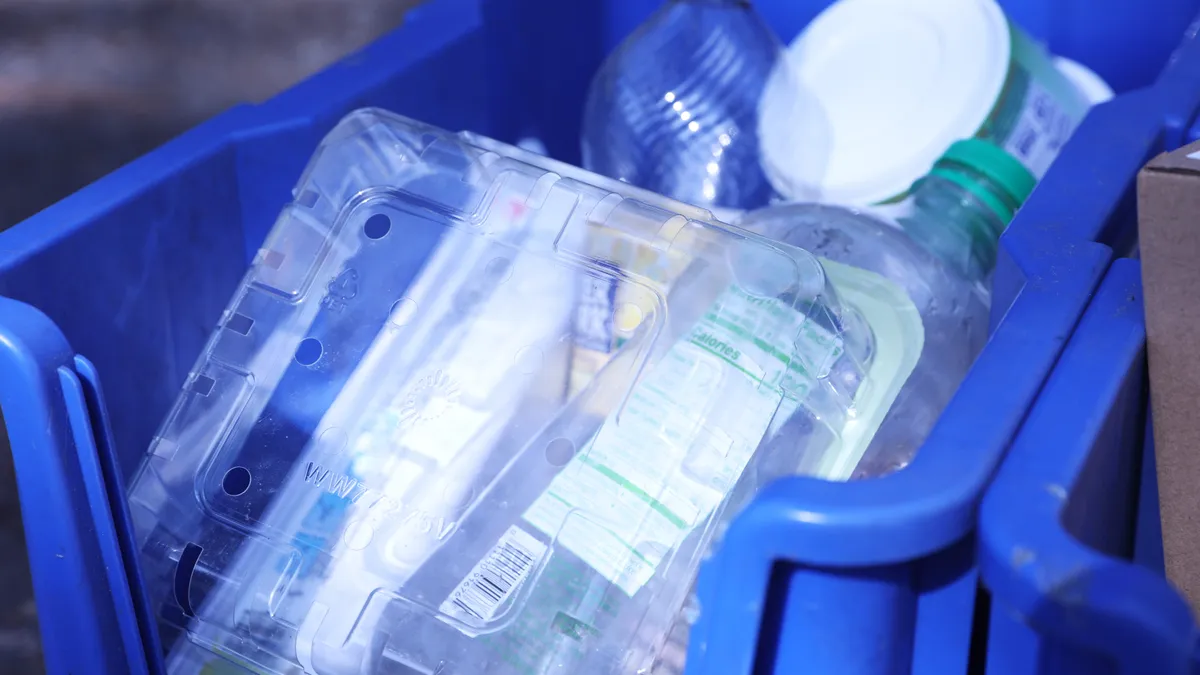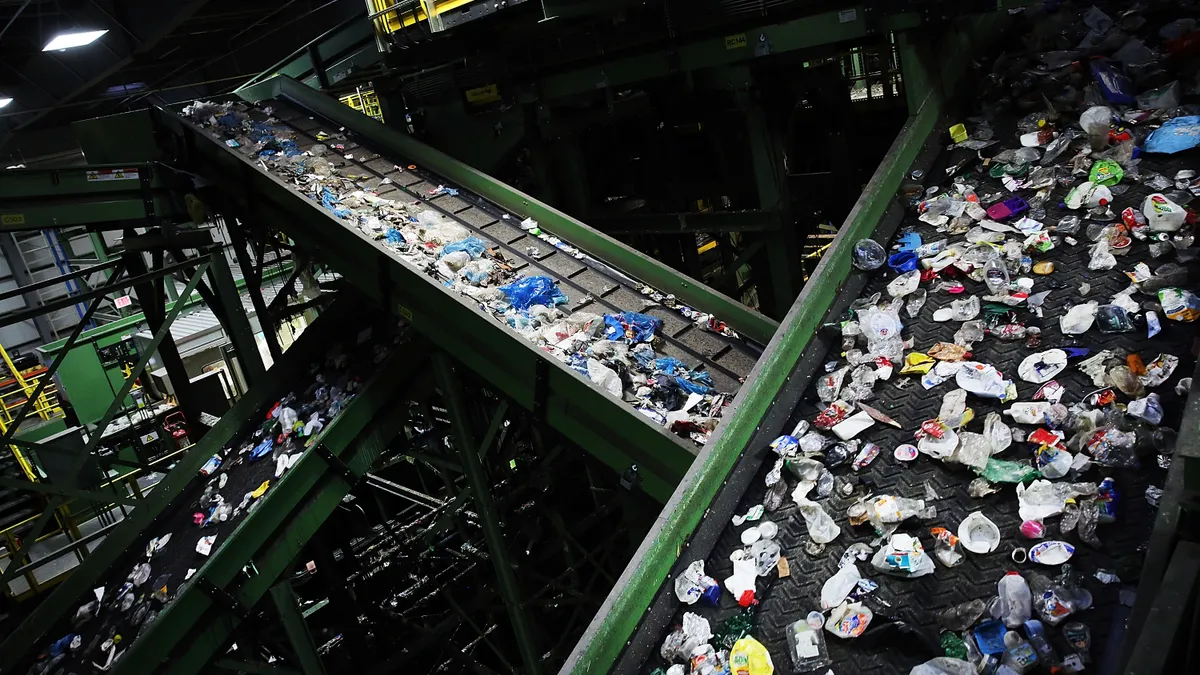Recycling proposals embracing fees and oversight are gaining traction among major groups backed by manufacturers and consumer product companies after years of resistance. Several new proposals in recent weeks back approaches ranging from a disposal surcharge and packaging fees to "pay as you throw" (PAYT) policies, even as support for concepts like extended producer responsibility (EPR) remains limited.
In one new report, "Accelerating Recycling," The Recycling Partnership (TRP) calls for eco-modulated fees and a disposal surcharge. The "Roadmap to Reuse" released this month by the American Chemistry Council (ACC) meanwhile backs PAYT and the development of "incentives and penalties" for packaging. The National Waste & Recycling Association (NWRA) has also grown more interested in recycled content policies.
The waste and recycling industry has long been resistant to fees, preferring to let markets drive and shape business. But the industry is undergoing a shift in response to struggling recycling markets and mounting pushback from the public around issues like marine debris and climate change.
"I do think we're going to see some policy changes over the next few years," said Anne Germain, NWRA's chief operating officer, discussing some recent proposals.
Germain expressed concern about policies that prioritize supply over demand and cited a disposal surcharge as one such example. But she said other approaches like incentives for recycled content are "key to balancing supply and demand."
ACC did not respond to a request for comment, but the trade group's new plastics initiative explicitly calls for multi-material packaging fees and recycled content growth, along with disposal fees in the form of PAYT. Waste Management also noted support for PAYT in a recent report of its own.
TRP's new report endorses changes to residential recycling through public-private partnerships, including a packaging and printed paper fee along with a disposal surcharge. A significant component of that proposal would be the creation of "a newly-established, industry-led, nongovernmental organization" serving as a Packaging and Printed Paper Stewardship Organization (PSO). TRP states the PSO is meant to serve at the national or state and regional level and would "take a uniquely American approach" to financing education and infrastructure needs.
The packaging fee would apply to glass, metal, plastic, and paper fiber, with the aim of encouraging manufacturers to design with recycling in mind. The PSO would submit an annual report on the state or federal level. The plan would offer eco-modulated "discounts" for items meeting certain parameters, like recyclability and certain recycled content levels. Proposed fees would not supersede existing policies including beverage container deposits.
The separate disposal surcharge would be managed by the public sector and would place an additional charge on "[MSW] landfills, solid waste incinerators and waste-to-energy facilities." It would be paid on a per-ton basis by facility operators but would exempt industrial, hazardous waste, and C&D landfills. Depending on state or federal scope, fees would either be distributed to local governments or states and used to fund recycling needs.
Dylan de Thomas, TRP's vice president of external affairs, said his organization has been in touch with lawmakers and trade groups since the report's release. He said policy action will be crucial to tackling recycling issues and indicated many approaches will be needed.
"This shared responsibility model is a good first step towards making that policy happen, but it's not the last step," de Thomas said, discussing EPR.
Other recent reports also take note of shifts within the recycling space. In a September report on "unprecedented shifts" in the North American circular economy, Closed Loop Partners (CLP) cited proposed EPR laws as an indicator of growing momentum.
"These kinds of laws can increase transparency, better accounting for the external costs of recovering materials after use and encouraging producers to harness design innovation," the CLP report reads.
The industry shift has already attracted attention from lawmakers. Sen. Tom Udall, D-NM, and Rep. Alan Lowenthal, D-Calif., released a statement Wednesday responding to the ACC and TRP proposals. The lawmakers are co-sponsors of the Break Free From Plastic Pollution Act — which includes EPR for packaging, recycled content requirements, and other policies — and called the proposals a "big step in the right direction." But they also said both proposals "place too much of the [plastic pollution] burden" on taxpayers and not enough on corporations.
Scott Cassel, CEO of the Product Stewardship Institute (PSI), expressed similar sentiments, calling TRP's report "encouraging but flawed." He said a number of the components referenced in that report echo approaches PSI supports, like the creation of a stewardship organization and submission of an annual report. But he said the proposal does not do enough to shift the cost burden away from municipalities.
"We need to modernize and stabilize recycling with an expanded system," Cassel said, adding "we need a system fully funded by the corporations."
Some organizations, like the Institute for Local Self-Reliance (ILSR), have previously voiced concern about an EPR system that shifts control of the waste and recycling system away from local governments. ILSR co-founder Neil Seldman said he was unable to respond in-depth to a request for comment on the new reports, but reiterated via email his support for product stewardship policies that would not shift control to corporations.
NWRA's Germain was critical of policies like a disposal surcharge, which she said failed to account for differences in how states import and export waste, and could prove problematic when funds are disbursed to municipalities or states. Germain said NWRA does not typically embrace fees of any kind. The organization similarly remains hesitant about EPR policies, although Germain said if EPR for packaging becomes law then NWRA is seeking for private and public sector facilities and collectors to "have a seat at the table" and remain involved in the process.
For now, NWRA is more invested in building market demand through mechanisms like recycled content mandates. One such bill, AB 793, recently passed in California. Other trade groups such as the Association of Plastic Recyclers and Institute of Scrap Recycling Industries have also come out in support of recycled content policies for packaging.
Despite some criticism of the new proposals, Cassel said he was supportive of the larger trend emerging from the industry. "They've moved from a position of strong opposition to being willing to discuss what type of EPR system they could operate under and support," he said. "That is significant."

















